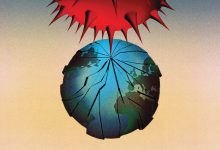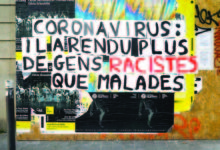Re-Education…Lessons Learned From A Pandemic Passed

On December 1st, World AIDS Day (WAD) brings together people from around the world to raise awareness about HIV/AIDS and demonstrate international solidarity. It is a day to commemorate. We lost lots of people unnecessarily, and well before their time. We have developed amazing drugs to treat and now prevent HIV disease, and in a remarkably short amount of time. We must continue to remember those who were afflicted with AIDS that were abandoned and mistreated by family, friends, and the medical establishment. They were ostracized like lepers, while suffering the indignity of having their cause of death concealed due to fear and stigma.
Over the years, WAD has been somewhat of a shape shifting affair. The World Health Organization first held the initiative to focus on the unheard cries and screams from both those infected and affected by the disease, HIV, (Human Immunodeficiency Virus) that we now know is responsible for AIDS (Acquired Immune Deficiency Syndrome). At an instant, it created a day to globally highlight and recognize their suffering, and for resources to be given to find a cure for what was then a deadly disease. The day is an opportunity for public and private partners to spread awareness and encourage progress in HIV/AIDS prevention, treatment and care around the world. It has become one of the most widely recognized international health days and a key opportunity to raise awareness, commemorate those who have died, and celebrate victories such as increased access to treatment and prevention services.
An estimated 40 million people worldwide have died of AIDS since 1981, and an estimated 37 million are living with HIV. In recorded history, it has become one of the most important global public health issues in. Despite recent improvements in treatment, the AIDS epidemic still claims an estimated two million lives each year, of which more than 250,000 are children. In some countries, it has been the leading cause of death.
This year’s World Aids Day is a poignant moment. As the world deals a new virus, those living with an older but less transmittable virus have much to worry about, but also much to contribute. COVID-19 has placed a heavy burden on health services across the globe. It has taken people and resources away from existing services, including vital HIV prevention work. On a global scale, HIV rates have stalled, with new surges in a few troubled regions and countries. It is possible that COVID-19’s effects on poorer communities could exacerbate things further, possibly reversing hard won public health success.
Today, HIV is for the most part a manageable disease, a long-term health condition, or ‘LTC’. Instead of dying from the complications that arise when it progresses to AIDS, many people now live with the virus in their bodies, held in check by drugs that, when first discovered, really did bring people back from the dead. While there are still people around the world acquiring and dying from HIV, it is no longer because we do not have treatments. Rather, it is due to their lack of awareness of being HIV positive or are unable to access the medications they need.
It is worth noting that access to treatments is not a just problem for developing countries or those without universal healthcare systems. Even in Canada, with our excellent record of HIV prevention and treatment, there are still too many cases of people being diagnosed late, which makes them more likely to develop AIDS. Many of those diagnosed are black African men and women (primarily from sub-Saharan Africa), a fact that highlights the challenges facing the communities that comprise this group, including structural racism in the NHS, HIV stigma within the communities themselves, and the impact of immigration policies on individual’s access to health services. It becomes clear that HIV is both a challenge, and an amplifier of others, often societal ones.
For those people who do find out their HIV+ status early after being infected, the treatment options are wide, and the outcomes are generally good. We have moved on from drugs that worked but had many side-effects to ones that have little to no impact on people’s everyday life. There are still some differences in experience, and as most drugs are tested on healthy young men, prescribing effectively for women and children can be more hit or miss for them than for men.
HIV drugs have also provided an unexpected option for preventing HIV transmission. In the early days, protocols were developed to enable rapid treatment to be given to people who had been exposed to HIV (initially through needle-stick injuries, and then through sexual exposure, known as ‘PEP’, or Post Exposure Prophylaxis), usually within twenty-four hours of them being exposed. Miraculously, the drugs were able to prevent the HIV virus from replicating sufficiently enough to overwhelm the body and enabled an individual’s own immune system to clear it from their body.
COVID-19 has returned to the global spotlight issues that the AIDS pandemic highlighted 30 years ago. It has reminded us of the impact that poverty has on disease progression, of the additional challenges that diseases present to women and girls in the developing world, and how disease can further disenfranchise marginalized groups across all societies, including LGBTQ+ people and sex workers. Positively, COVID-19 has also seen a return of community-led responses. Across the world, community groups have stepped up to deliver testing, treatment, and care; many based upon existing networks created from the AIDS pandemic response. In Canada, the pandemic saw the emergence of mutual support groups, with volunteers coming forward to support vulnerable people and provide information and aid to support government responses. There has been an echo of HIV/AID supports groups, like ‘The AIDS Committee of Toronto (ACT)’ and ‘Ontario AIDS Network’ in the 80’s and 90’s, which continue to be an amazing resource.
And as we are now beginning to discover, the long-term effects of being seriously affected by COVID-19 may harm many of our fellow citizens. They may need additional healthcare support, which may be different to the life they envisioned lay ahead at the start of this year. People living with HIV have a lot to share on that front. With their history of creating support groups and seeking dedicated treatments, their experience serves as a road map for the survivors of this new illness, which has been described by some clinicians as being like a mix of influenza and HIV.
Also, we must be on the watch for unexpected impacts from the pandemic. While thankfully, the risk of catching COVID is the same for those with stable HIV and taking ART (Antiretroviral Therapy), as the general population. For those who do not know their status or who are unable to access ART, the chances of catching it are much greater. This is a fact boldly illustrated, by the way in which tuberculosis spread unchecked among people living with untreated HIV in Africa and Asia in the 1990’s.
We must never forget the appalling stigma, neglect, homophobia and hatred they endured, otherwise, history will keep repeating itself. It is also important to remember today those still living with HIV, especially LTS, who continue to help break down misconceptions about it. Their insight is so inspiring and to a large extent ignored. We will always be indebted to them for being on the front lines fighting when there were no treatment options. Many LTS were used as human guinea pigs, so that society today now have antiretrovirals that make HIV a chronic, but manageable condition.
Finally, HIV disease swept slowly but inexorably around the world, showing us where our focus was missing, our energies lacking, and our compassion missing. Some of the efforts that helped tackle it have provided vital information for our response to the COVID-19 pandemic. But there is still learning to be had. As we contemplate WAD this year, individually, and organizationally, I think our challenge is to help our healthcare services learn quickly and effectively from the lessons of our HIV/AIDS past.






Redes Sociais - Comentários